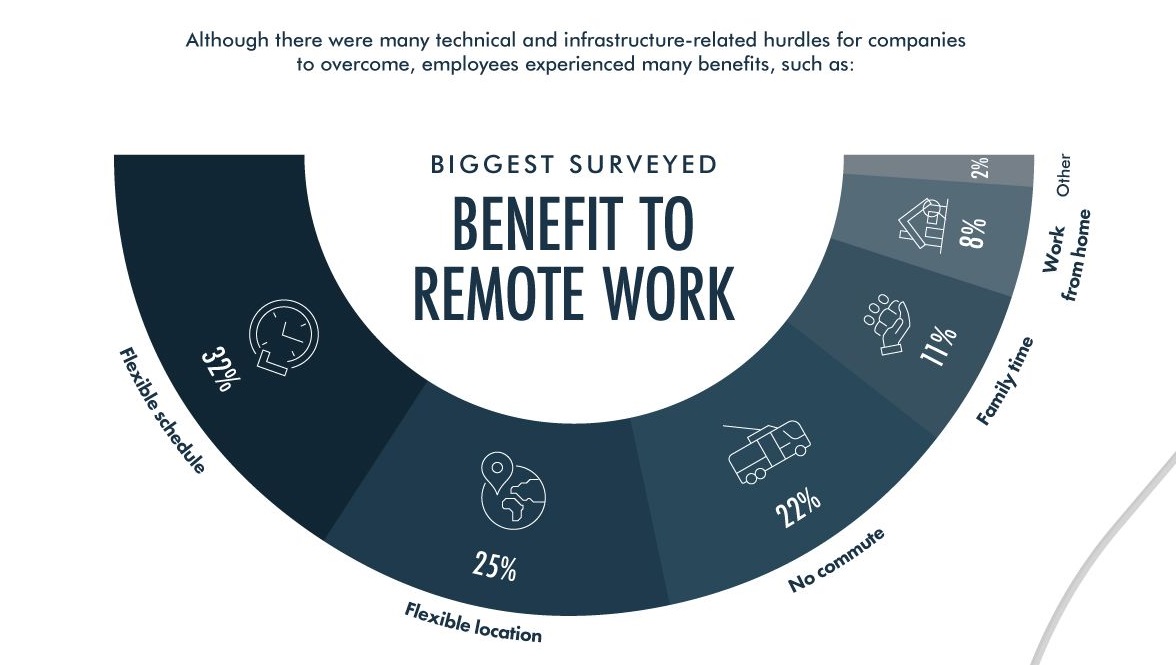Investing in the New World of Remote Work
The following content is sponsored by eToro


Investing in the New World of Remote Work
The COVID-19 pandemic was a major catalyst in the future of work.
We quickly learned that work could be done practically anywhere. To emphasize the impact remote work culture has had, consider the fact that some 71% of Americans did some type of remote work in 2020, compared to just 20% pre-pandemic.
This infographic from eToro dives into the new world of remote work and explores the main trends investors need to know.
Reaping the Benefits
Remote work culture has been met with positivity by both workers and employers. While the benefits may vary from person to person, there are a key few that seem to resonate on a wide scale. For instance, 32% of survey respondents point to flexible scheduling as a top benefit.
| Employee Benefits From Remote Work | Employee Response (%) |
|---|---|
| Flexible schedule | 32% |
| Flexible location | 25% |
| No commute | 22% |
| Family time | 11% |
| Work from home | 8% |
| Other | 2% |
In addition to happier workers, productivity has seen an untick as well. About 56% of workers report being slightly or considerably more productive during the pandemic. By contrast, only 28% report being either slightly less or considerably less productive.
Challenges to Address
Of course, the remote trend does not come without its fair share of challenges.
The most notable is being unable to unplug from work. This might be the result of constant and seemingly endless emails, or perhaps the lack of being able to physically leave your desk and office. The effects of digital burnout could be why 64% of workers surveyed say they prefer to commute again rather than sort through emails and why fake commutes are trending.
Here are the top challenges of working remotely:
| Top Challenges | Employee Response Rate (%) |
|---|---|
| Unable to unplug | 27% |
| Loneliness | 16% |
| Collaboration and communication | 16% |
| Home distractions | 15% |
| Motivation | 12% |
| Different time zones | 7% |
| Other | 7% |
Challenges and flaws to the remote model are inevitable. But so too are innovative solutions.
Portugal is one example, with recent labour laws passing prohibiting bosses from messaging you during the after work hours. What’s more, it’s likely that the remote work model may continue with further adjustments and fine tuning.
The Future of Remote Work
Ultimately, remote work will likely continue having its challenges, but for most, the benefits do appear to outweigh the costs.
And there are a number of indicators that suggest the remote trend is here to stay. For starters, mentioning’s of remote work in public company transcripts have soared. As have the number of remote job postings:
| Industry | Remote Job Postings (Sept 2020) | Remote Job Postings (Sept 2021) |
|---|---|---|
| Software & IT Services | 13% | 30% |
| Media & Communications | 13% | 21% |
| Wellness & Fitness | 3% | 21% |
| Healthcare | 3% | 14% |
| Nonprofit | 5% | 14% |
| Hardware & Networking | 2% | 13% |
| Corporate Services | 5% | 10% |
| Education | 9% | 9% |
| Entertainment | 3% | 8% |
| Finance | 2% | 7% |
| Consumer Goods | 2% | 6% |
| Recreation & Travel | 0% | 4% |
| Manufacturing | 1% | 3% |
| Energy & Mining | 1% | 3% |
| Retail | 1% | 1% |
Unsurprisingly, the nature of work in certain industries is resulting in large disparities between remote adoption growth rates. For instance, software and IT remote job postings have more than doubled since September 2020, while retail has stayed flat (it’s a lot easier to code remotely compared to selling clothes).
But the broader overall trend for remote jobs continues to point upwards. In the long run, companies that choose not to lean into some form of a remote model might see their ability to attract talent falter.
Workers who say they prefer an office-only approach represent an extremely small slice—just 2%. Furthermore, some serious cost savings may be missed, the remote model can save an employer up to $10,000 a year, per employee, from real estate costs alone.
How Can Investors Take Part?
eToro’s RemoteWork Smart Portfolio* gives investors direct access to the remote work industry.
Curated by experienced and proven investment teams, the thematic portfolio offers exposure to a broad range of companies partaking in the remote work revolution, with no management fees.
*Your capital is at risk.
Smart Portfolios is a portfolio management product, provided by eToro Europe Ltd., which is authorized and regulated by the Cyprus Securities and Exchange Commission.
SmartPortfolios should not be considered as exchange traded funds, nor as hedge funds.

-

 Sponsored3 years ago
Sponsored3 years agoMore Than Precious: Silver’s Role in the New Energy Era (Part 3 of 3)
Long known as a precious metal, silver in solar and EV technologies will redefine its role and importance to a greener economy.
-

 Sponsored7 years ago
Sponsored7 years agoThe History and Evolution of the Video Games Market
Everything from Pong to the rise of mobile gaming and AR/VR. Learn about the $100 billion video games market in this giant infographic.
-

 Sponsored8 years ago
Sponsored8 years agoThe Extraordinary Raw Materials in an iPhone 6s
Over 700 million iPhones have now been sold, but the iPhone would not exist if it were not for the raw materials that make the technology…
-

 Sponsored8 years ago
Sponsored8 years agoThe Industrial Internet, and How It’s Revolutionizing Mining
The convergence of the global industrial sector with big data and the internet of things, or the Industrial Internet, will revolutionize how mining works.
-

 Sponsored3 years ago
Sponsored3 years agoMore Than Precious: Silver’s Role in the New Energy Era (Part 3 of 3)
Long known as a precious metal, silver in solar and EV technologies will redefine its role and importance to a greener economy.
-

 Sponsored7 years ago
Sponsored7 years agoThe History and Evolution of the Video Games Market
Everything from Pong to the rise of mobile gaming and AR/VR. Learn about the $100 billion video games market in this giant infographic.
-

 Sponsored8 years ago
Sponsored8 years agoThe Extraordinary Raw Materials in an iPhone 6s
Over 700 million iPhones have now been sold, but the iPhone would not exist if it were not for the raw materials that make the technology...
-

 Sponsored8 years ago
Sponsored8 years agoThe Industrial Internet, and How It’s Revolutionizing Mining
The convergence of the global industrial sector with big data and the internet of things, or the Industrial Internet, will revolutionize how mining works.


